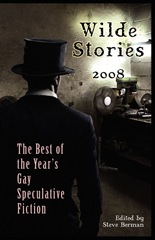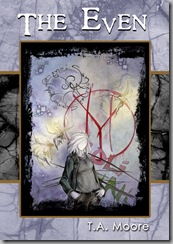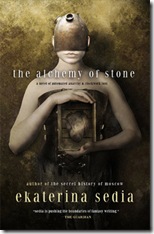
Greetings Steve, nice to be able to interview you. There's been quite a bit going on for you recently with several stories out and nominations abound...
1. Care to tell us all a little bit about your recent exploits?
Thanks, Mark. Well, my novel, Vintage, released last year but the original publisher was bought by another press uninterested in fiction. Fortunately, the book returned from the dead through Lethe Press and became a finalist for the 2007 Andre Norton Award. It’s also been nominated for the Gaylactic Spectrum Award Best Novel. Actually, now that I think of it, I’m nominated in all three Spectrum categories: for Vintage, for So Fey (Best Other Work), and “Bittersweet” (Best Short Story) from the Journal of Mythic Arts.
I’ve been promoting the 2008 release Magic in the Mirrorstone of late. It’s a young adult fantasy anthology I edited for Mirrorstone Books (the children’s publishing arm of Wizards of the Coast) with fifteen stories by such well-known authors as Holly Black, Greg Frost, and Nina Kiriki Hoffman.
I have stories in two Prime anthologies this summer, and a new annual anthology I edited reprinting the best gay speculative fiction, Wilde Stories, releases from Lethe Press at the month’s end. Oh, and my next short story collection, Second Thoughts comes out in time for my birthday in August.
As I said, the odd thing here and there...
2. Who got you writing and who inspires you now?
I don’t think there was any single individual or even author that inspired me to write. When I was in elementary school I wrote these really awful short short stories about a secret agent. I shudder to think of them now. The rest of class would groan when I was about to read one.
Who inspires me now? I think inspiration is the wrong term. Rather than a muse, I have support. Support from my family, support from good friends.
Support is good, support is underrated.
3. What the hell is speculative fiction anyway and do you consider yourself a speculative fiction writer?
You want me to speculate on speculative fiction? All storytelling demands some imagination, on the part of the teller and certainly with the listener/reader. But, to me spec fic is any form of fiction where something odd or weird is a necessity for the author to tell the story. Thus, it could range from high fantasy to space opera, supernatural horror, to magic realism. Parables and fairy tales are also often speculative fiction. Without the strange element, the story would seem truncated to the reader.
I would say that, outside of some articles and essays, almost everything I’ve written is speculative fiction.
It's been an interesting question this one, as I don't think I've gotten the same answer twice...
4. What should publishers like myself be thinking of at the moment when looking for new work in the spec fic scene, what do you think the market is missing, and what are its strong points?
This is a tough question. My first reaction is: publishers need always be concerned with quality versus trend. I’d rather read a well-written book with familiar themes than something trendy but poorly constructed.
As for what is missing, I’m still surprised that the speculative fiction field seems very much a white room; there are too few minorities (as much as I hate the world, in spec fic its apt to describe authors’ ethnicities). The question to ask is: why does the field, in all its varied scope, not attract more African-American, Asian-American, and Latino-American writers? There’s some disconnect here. If I went to the cinema when Lord of the Rings was playing and took a census, what would be the ethnic mix? Certainly more than what was on the screen. Who was the last non-white hero or heroine of a well-done science-fiction movie?
That said, there are some strong points to the current market. Sexual orientation is no longer the boogeyman as it once was. Mainstream publishers are releasing books that deal with gender issues. I’d like to think this reflects on a wider readership. We still have far to go, though.
Agreed (not that my books are breaking any boundaries in that area though...)
5. What do you do when you're not writing?
Mostly think about why I’m not writing. Then feel guilty for not writing. Okay, that’s not entirely true. I do have a day job. And I do spend time with my parents a great deal. Otherwise, I’m really dull. I read, I watch old movies.
Ah that guilty feeling when not writing...
6. Onto the obligatory music question (well for me anyway): are you a music listener when you write or are you a lover of silence? If so what do you listen to or what inspires you?
Well, if I’m writing during breakds in the dayjob, then there’s no music. At home, I do try and have something playing the background. I’m sure I’m not alone in liking an eclectic selection of music. Let’s see... what’s on my iPod. Terri Windling infected me with love for Seth Lakeman. Then there are musicals (Hairspray, Guys and Dolls, Oliver!). Some Bob Hope, some Melissa Etheridge. A dose of Cute is What We Aim For, a dash of Madeleine Peyroux with a pinch of Girlyman. And every playlist deserves some Gin Blossoms or Ottmar Liebert.
*tries to get his around Bob Hope to spec fic... fails*
Bob Hope and spec fic are perfect today. The Road movies often featured bizarre events. My favorite, Road to Morrocco, featured talking camels and a ring that granted wishes. Then Hope was the star of Ghost Breakers, a terrific voodoo comedy.
7. Where do you see yourself as a writer in five years?
I’m never good at prognostication. For years I tried Ouija until someone told me the proper method is through a board and not a bowl of alphabet soup.
All I can hope for is that I’m still alive, still challenging myself to write better stories, and maybe even still being read.
*laughs* are you saying it isn't done through soup?
8. What tips do you have for the new and budding writers out there?
Well, too often I hear new writers boasting how little revision they do. This misconception of the writing process—that revision is proof of poor skill—actually works to their detriment. Revision should be embraced for the powerful tool that it is.
Also, in regards to the notion of support I mentioned earlier, every writer benefits from having other writers in his or her social circle. It could simply be a writing buddy or as advanced as a critique group, but being able to meet with a friend creates a welcome environment for talking about stories, writing techniques, and comfort during some of the lonelier moments that happen to all writers.
Lastly, do not compare your career to that of others. Trust me, that path only leads to melancholy. There will always be some writer younger than you, or more skilled, or faster, better paid, and so on. Telling stories for pay is not a competition. Yes, there are awards for writers, but you should concern yourself with the rewards: finishing the best story you can and knowing that some stranger out in the world you could never hope to meet in your lifetime is reading your words and finding meaning in them.
Excellent advice, some stuff to be noted here!
9. Why mroctober on live journal and why the pumpkin head? Is that a really obvious question?
*notes that his birthday is August*
Oh, back in 1994, I had my two first professional sales, one to Dragon and one to White Wolf Magazine. Both were Call of Cthulhu gaming articles and both released in October. I spent a fortune having them framed. My friends started calling me Mr. October after that.
Why the pumpkin head? Oh, Halloween is my favorite holiday and nothing seems to evoke that image better in my mind than a scarecrow with a jack o’lantern noggin.
Okay, I'm glad I asked as it's not as obvious as first seemed!
10. Last but not least I saw in your first answer (and from the excellent cover artwork) that you've edited an anthology. How was that and how does it compare to writing?
I’ve actually edited four anthologies to date. It’s a very different process, more like buying a puzzle, then discovering that you have to choose the pieces first from several boxes and find the best way for them to fit together.
Writing for me is an introverted pursuit that is prone to anxiety because the success or failure relies only on myself. Editing allows me to be more extroverted. The very nature of inviting authors to submit, of choosing stories, brings me into contact with a number of extraordinarily talented people. Plus, the caregiver in me enjoys sharing words I have come to value with others.
Nice to hear! Thank you so much for coming along and I wish you all the best with your projects and really hope to see something of yours over at Morrigan Books in the future!
Thanks, Mark. I’m truly flattered you took the time to talk with me.


